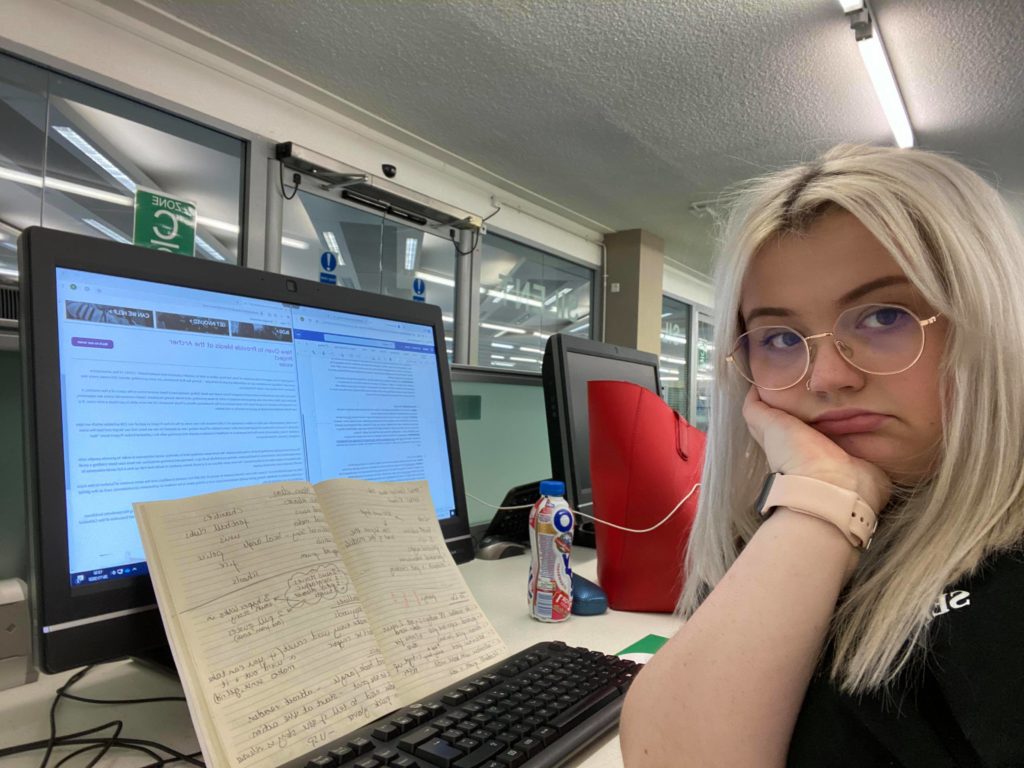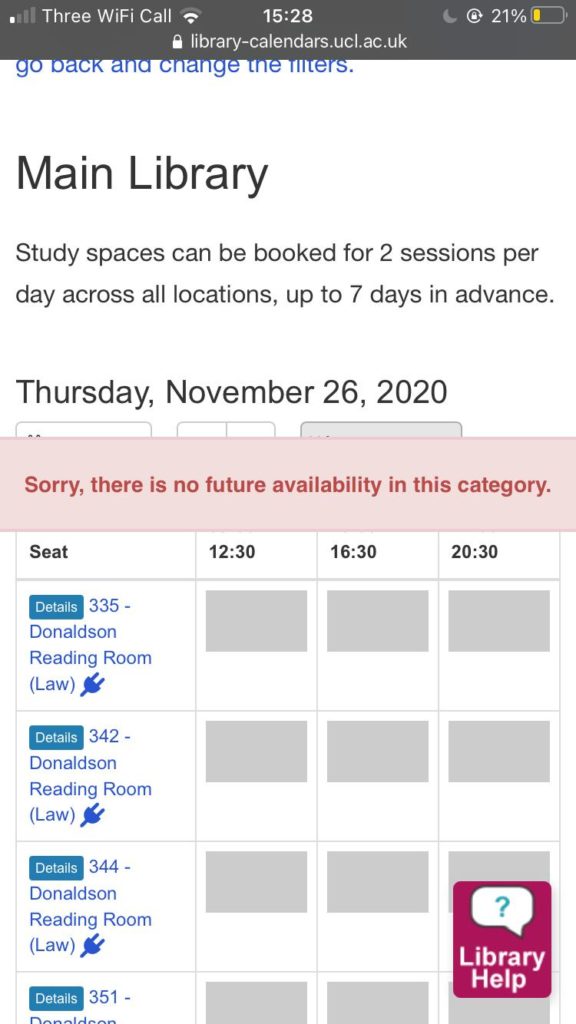
The Class of 2021 are owed a no detriment policy, read for yourself
Our conditions are no different from last years graduates, with less support and academic security so where is our no detriment policy?
The Class of 2021 are the greatest unsung victims of the ongoing university crisis during the pandemic and it is time that someone did something about it. Unlike our predecessors who received nearly 2 terms of face to face teaching, hefty no detriment policies and extenuating circumstances left, right and centre, we have been left with nothing except the half-hearted reassurance that our degrees will be completely unaffected and ‘educational quality is the same as before’.
For many students they have not had a single face to face class since term commenced in September, there is a mental health crisis that is ravaging through the student population and all the while we are having to navigate through life trying not to catch Covid.
We deserve a medal just for turning up to online lectures, and instead, the pressure is laid on even thicker than before: new styles of assessments, extra summative assignments and online exams that are more difficult than before. Yet, unis are still running with the line that nothing has changed and everything is fine?
Absolutely nothing is fine about what is happening to students. Since September we have been vilified for the rise in cases, been left to try and comprehend poorly thought out government ruling about student life and pay £9250 in fees when the education we are receiving is inadequate and not what we signed up for at all.
So, it’s time to speak up, where is our no detriment policy?
“If we wanted to do an online degree we would have gone to the Open University and paid a third of the fees” Georgia, Classics
For many students, their module structures have undergone huge changes to make them compatible with online learning. In many cases, they have become more difficult or the style of assessment has been completely overhauled. Examination based modules are now entirely contingent upon large essays and coursework. I specifically chose to come to UCL because they had lots of exam-based modules, and I perform much better in exams than essays. Now I am in my final year and am expected to write over 30,000 words in essays.
On top of this, like many other students, I was limited going into my final year with my module selections because many departments have cancelled modules on grounds of the pandemic. So, my learning experience is not at all the same. Educational support might as well be synonymous with fairy dust, and we haven’t even touched on the difficulties of online learning.
“Learning online means I’m basically getting a degree in how well I can watch TV” Rav, English
Online learning is hugely impacting students’ abilities to learn and understand materials. Studies suggest that attention spans online decrease to 15 minutes wherein a face to face environment they range from 50-90 minutes. These statistics are well known in the pedagogical world, so why is that academics, who literally thrive and make their career out of learning, are turning a blind eye to how it might affect their students?
We spoke to students studying Classics, History and Languages and all of them said they have at least one day where they have over 4 hours of back to back online tuition. When the student attention span is 15 minutes how on earth are students expected to concentrate for 4 hours or more? Natalie told us “On a Monday I have 7 hours of lectures and my only gap is between 10 – 11 am otherwise I am in class all day.”

Not only are students overwhelmed by excessive screen time but they have to tolerate numerous tech issues whilst this is all ongoing. The only thing more frustrating than when your computer is playing up is when it’s your lecturers. Face to face lectures don’t come with the problem of screen lag, wifi disconnecting, poor mic quality, screen-share not working.
Back to the TV analogy, your appreciation of a TV episode all rests in the balance of how good your streaming quality is. If it’s bad you don’t remember the episode but the buffer times; that bit where the sound cut out and you missed crucial dialogue; the part where the screen went blank and you just sat around waiting for it to return. Now, this is the primary method of student learning.
These problems are not few and far between but regular occurrences that often affect the entire student body. Today UCL announced major network issues that affected many students ability to attend their lectures or access vital materials for their learning. The issues are staring us in the face yet we are not being offered the academic support we need; having a no detriment policy could change all of that.
 “Seminars aren’t really seminars at all” Eleanor, History
“Seminars aren’t really seminars at all” Eleanor, History
We have already written an entire article on why seminars are effectively obsolete this year. However, the primary point is that they are meant to be intimate and supportive learning environments where you go through things in-depth with a Post Graduate Teaching Assistant and resolve any concerns you have, and now they are not.
• Every ‘stupid question’ you ask is on record for everyone on your course to watch over and over again.
• Your teacher can’t look at your work properly because you’re separated by a computer screen.
• Discussion is impossible because only one person can speak at a time on Zoom.
So many students are having their learning majorly stunted, how is a no detriment policy not even being discussed?
“The pandemic is still a thing but I think unis have just forgotten what that actually means” Charlie, Classics
So, there is a still a pandemic going on and people are still getting horrendously ill and in some cases dying. Since the second wave, university students have been hammered by coronavirus and unlike last year where it was an easy enough process to self award extenuating circumstances or contact someone to help, old policies are back in place and are frankly insufficient.
Students are suffering, they are getting sick and then have to isolate alone in shoddy student flats. Not only are they having to try and fight off Covid they then have to balance the stress of catching up on missed classes, writing essays and handing them in on time, whilst navigating confusing Extenuating Circumstances forms. And, they’re doing all of this alone and they have no comfort or reassurance that they have a no detriment policy to support them.
Physical health isn’t the only concern for students, there is a mental health crisis that is overwhelming the student population. Eating disorders are on the rise, 13 students have died because of factors relating to mental health and confessions pages are being overwhelmed with posts about the rapid decline in student mental health.

Students are struggling more than ever, yet there is no support in sight for their academic wellbeing. Student Mental Health services are being overwhelmed and people are wanting to drop out more than ever. A simple no detriment policy could mean the world to some people. We spoke to one student who said:
“My grades are plummeting, I hate myself and I think about taking my own life every day.”
Plummeting grades are also not being helped by insufficient working spaces. For many students, their uni flats are not designed to become full-time study spaces. They don’t have desks, they are cold and wifi is patchy at best. Universities employ interior designers and ergonomic experts to make sure that learning environments are designed to optimise productivity and student learning experiences. I strongly doubt that every student’s landlord is taking the same measures.
Whilst campuses are theoretically still open many students are reluctant to go onto campus because it puts them at risk of exposure to the virus.
“My lecturer told me to avoid campus where possible because cases are spreading like wild-fire” Millie, Archaeology
Campuses are hotspots for virus spreading without even considering students may have to take public transport to get onto campus. All of these unnecessary exposures are very real deterrents for many students considering their study options.
Also, libraries and public study spaces ask you to wear a face-covering at all times, if you haven’t already tried, go away and put a mask on and try concentrating for in excess of 2 hours. It doesn’t happen. Every 30 seconds you’re distracted by your wheezy breathing and steamed glasses.
Library spaces are also like gold dust. They are difficult to book, hard to come by and when they are available they are for such a short amount of time that it provokes the question ‘Is it worth trekking to campus and putting myself at risk?”

“Group projects are hell on earth” Oliver, Stats
For many students group projects form part of their final assessment, since we entered Lockdown 2 it has become almost impossible to meet up with your fellow presenters to plan your project unless you do so over Zoom. In case we weren’t already being bogged down by excessive screen time why not go and have some more?
Trying to discuss articles, plan speeches and make learning materials remotely is a nightmare and if you do manage to book one of the elusive group study spaces on campus you’ll only have an hour-long slot, so good luck trying to get everything done in that time.
It seems pretty evident that no one has even thought about the consequences of group work on summative assessments. Considering group work is virtually impossible to do well, how is it fair that some students are having their final grades determined by it?
Any no detriment policy mentioned?
That’ll be radio silence again.
“Let’s not forget, that no one has any idea what students should be doing with themselves but, every time something goes wrong there’s no doubt it’s our fault” Maria, ESPS
Government guidelines regarding students have been unclear and confusing at the best of times. Yet, students are being scape-goated time and time again for the spread of the pandemic (watch this space as students will inevitably be blamed as the Christmas Superspreaders).
When protocols are put in place to benefit students, half the time they do more harm than good. Whilst it is nice that many students will be able to return home for the Christmas holidays to see their families, they are being sent home in the middle of essay season, with deadlines scattered throughout the moving period. For many students, they are being forced to travel long distances during a crucial hand-in period taking up valuable working time.
Whilst some departments have added grace periods of two or three days for deadlines, that really doesn’t factor in how disruptive that sort of move will be for many students. Rather than a half-hearted grace period how about a tangible no detriment policy that actually supports students?

“The job market is saturated as hell, we were already going to be competing against last year’s grads for jobs and now they have the upper hand because they’re sat on their 2:1s and 1sts that they got through no detriment.” Matt, Maths & Econ
Ultimately it’s just not fair. Last years graduates in many cases were put in better conditions than we are now. Assessment criteria were changed to be more forgiving, large chunks of assessment were marked pre-coronavirus and they could all rely on the fallbacks of Top 60 credits or last year’s grade.
For us, we are having to complete all 120 credits, to the highest standards, with no fallback from the year before or the comfort that if a few modules go wrong it’s only our top ones that will be counted.
Last year’s graduates only lost out on their final assessment period, we will have lost out on a whole year’s worth of teaching, 2 assessment periods, coupled with not one but two national lockdowns. It is more than evident that the quality of online teaching is substandard, resources are still difficult to access and the mental health crisis that universities were all too concerned about last year is still rising yet no one is doing anything about it.
At the end of the day, a student will spend £27,750 on university tuition fees alone. If you spent that much money on a car you would expect it to work, more than that, you would expect it to be supportive, reliable and have a comprehensive guarantee in the case of failure. Why are our degrees not being treated with the same respect?
All we are asking for is to be given the fair chance to succeed, let us have a no detriment policy.
Please sign the UCL Justice For Students petition to help re-instate an academic safety net for students this year.
*All names have been changed to protect the identities of these students









































